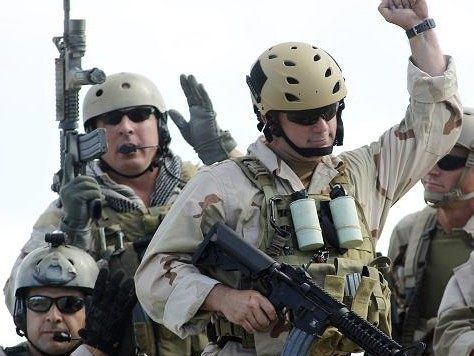The Associated Press reports that general details of recent surveys regarding the integration of women into elite commando units have been discussed by Special Operations Command officials for the first time. While the exact details of these surveys remain confidential, it’s clear that special operations troops have deep misgivings about the introduction of women into their extremely demanding units… and worry that it will happen anyway, due to pressure from feminist political culture.
Studies that surveyed personnel found “major misconceptions” within special operations about whether women should be brought into the male-only jobs. They also revealed concerns that department leaders would “capitulate to political pressure, allowing erosion of training standards,” according to a document viewed by the AP. These concerns were voiced by many women working for Special Operations Command in support roles, as well as male combat troops.
That’s a very odd turn of phrase. Are we supposed to believe that special operations troops — who responded to these surveys at remarkably high rates, indicating deep concern about the subject — have “major misconceptions” about the demands of their own jobs? Or is that supposed to say major apprehension?
Later in the article, there’s a direct quote from force management director Dan Bland that he thinks the surveys reflect “reservations or misperceptions in the force in terms of why we’re doing this,” so it looks like the official line will be that macho Neanderthal commandos don’t properly appreciate the importance of fully integrating women into every single branch of the armed services. Fears of lowered standards to make it happen at all costs are probably well-grounded.
The idea behind these surveys is to require a strong defense of why any given position should be closed to female applicants. The article mentions a small number of female applicants going for positions with the Night Stalker helicopter insertion team, with one female pilot now in active service and three more in training, plus 16 training for helicopter crew positions and 25 working toward other jobs.
There are doubtless fewer reservations about women who can meet the standards for such positions. The article mentions concerns about sexual harassment, assault, and women receiving “unequal treatment” in special ops positions, but at this point it’s unlikely such objections would be given any great weight by the Pentagon brass — those are viewed as problems to be addressed after postings are opened to women, not reasons to refrain from opening them.
The more serious worries from Special Ops leaders and soldiers is that training standards for these incredibly demanding jobs will be lowered to get a politically desirable number of women through the programs. Pentagon officials resolutely insist they won’t do this, no matter how much pressure is brought to bear, but there appears to be some skepticism among the ranks about their ability to resist political correctness.
“Positions within the special operations forces, including the clandestine Navy SEAL and Army Delta units, are considered the most grueling and difficult jobs in the military, with training and qualifying courses that push troops to their physical, mental and emotional limits,” the AP writes. “The commandos often work in small teams in harsh, remote locations. As a result, those jobs are some of the last to be addressed as commanders review the qualifications needed and assess the impact of bringing in women.”
There don’t seem to be many women interesting in going after these front-line special ops positions, but that hasn’t stopped the military from putting considerable effort into studying sexual integration. The closing paragraphs of the AP story are the most troubling:
In an email last month to members of the special operations forces across the services, Gen. Joseph Votel, head of U.S. Special Operations Command, said leaders had done initial analysis on training, facilities, education and other policies. Now, officials are examining “the social and cultural challenges of integrating females” into male-only jobs.
Next, Votel said, officials will analyze requirements for the jobs to make sure standards are accurate and gender neutral.
“We will continue in our commitment to provide the best manned, trained, and equipped special operations personnel to execute our nation’s most difficult and sensitive missions,” Votel said. “With that in mind, we can assure you that our high standards will not be lowered.”
Bland said that in addition to Votel’s email to service members, leaders have discussed the issue with commanders at frequent meetings so they can better educate their troops.
It sounds like they’re putting more effort into finding reasons to lower “inaccurately” tough standards and “educate” the special operations community about integration than studying whether it’s truly a wise course to pursue. Is the brass likely to conclude it’s unwise and turn away from integrating women into elite commando units, after putting this much effort into “studying” whether it can be done?

COMMENTS
Please let us know if you're having issues with commenting.